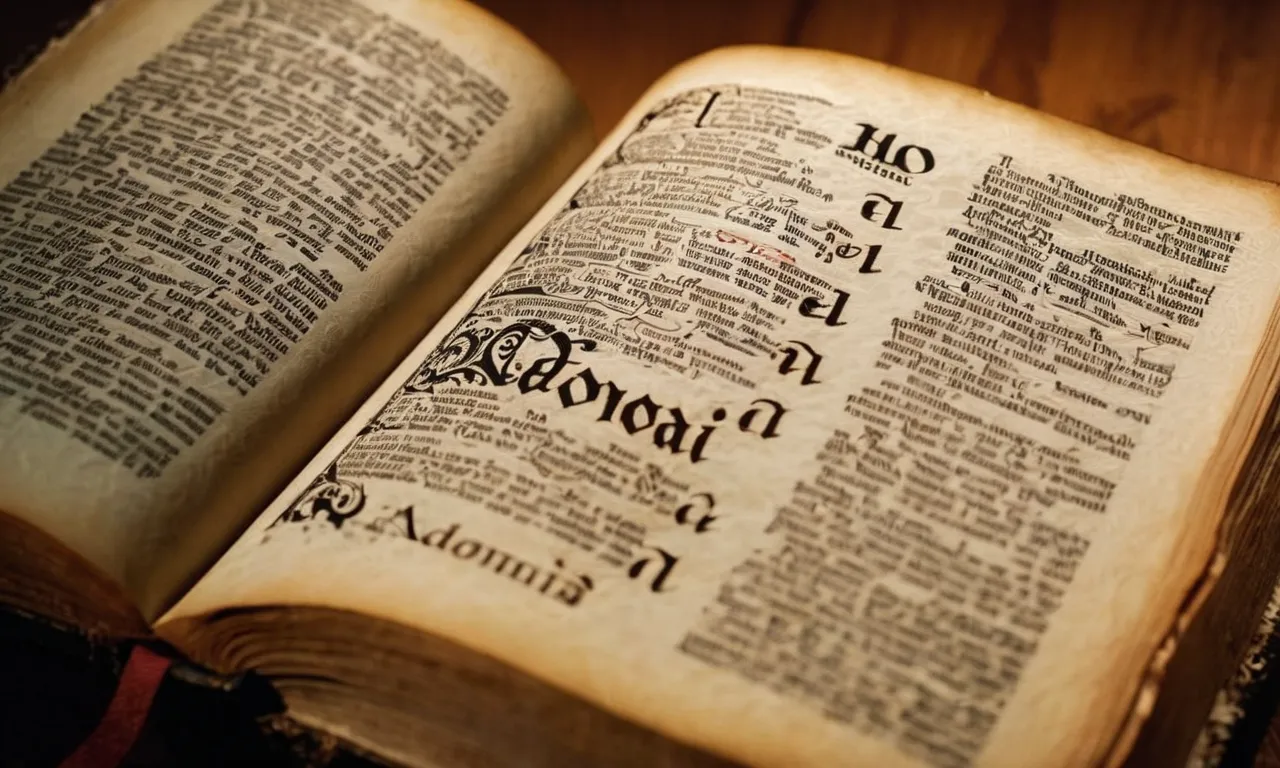Who Is Adonai In The Bible? A Detailed Look At The Divine Names Of God
The name of God holds deep meaning and reveals much about His nature and character. If you’re wondering ‘who is Adonai in the Bible? ‘, you’ve come to the right place. In this comprehensive article, we’ll provide a detailed look at the divine names of God, with a focus on unpacking the meaning and significance of the Hebrew name Adonai.
Here’s a quick answer before we dive deeper: Adonai is one of the Hebrew names of God found in the Old Testament. It expresses God’s absolute sovereignty and lordship. Adonai is often translated as ‘Lord’ or ‘my Lord’ in English translations of the Bible.
The Significance of God’s Names in Scripture
God’s names reveal His attributes and character
The names of God used in the Bible act as a roadmap to His character and attributes. By calling Himself different names like Elohim, El-Shaddai, Yahweh, and Adonai, God reveals different aspects of His nature and how He relates to humans.
Just as we choose names for our children that reflect positive ideals, God’s names reveal who He wants us to know Him to be.
For example, the name Yahweh communicates God’s self-existence, self-sufficiency, and eternal immutability. Elohim reveals His supreme power and sovereignty over all creation. El-Shaddai expresses God’s all-sufficiency and nourishment. Each name illuminates key facets of God’s identity and nature.
Different names emphasize different divine aspects
By using different names for Himself throughout Scripture, God emphasizes certain attributes that are specially relevant in specific contexts. His names are not arbitrary but deliberately highlight certain divine characteristics.
For instance, during the Exodus when God miraculously delivered Israel from Egypt, He revealed Himself to Moses as Yahweh to underscore His covenant faithfulness and unwavering commitment to save His people (Exodus 3:14).
By contrast, God revealed Himself as El Shaddai (“God Almighty”) to the patriarch Abraham, emphasizing His power and abundance to fulfil the covenant promises (Genesis 17:1).
Therefore, God’s names are like multi-faceted gems, casting light on different divine perfections adapted for particular circumstances. They provide a fuller revelation of who God is in all His glory.
Old Testament names for God in Hebrew
The primary names for God used in the Old Testament are:
- Elohim – God’s power and might as Creator (Genesis 1:1)
- El – God’s strength and provision (Genesis 33:20)
- El Elyon – God Most High (Genesis 14:18)
- El Shaddai – God Almighty (Genesis 17:1)
- Yahweh – The eternal, self-existent God (Exodus 3:14)
- Yahweh Jireh – The Lord Will Provide (Genesis 22:14)
- Yahweh Nissi – The Lord Is My Banner (Exodus 17:15)
- Yahweh Shalom – The Lord Is Peace (Judges 6:24)
- Yahweh Sabbaoth – The Lord of Hosts (1 Samuel 1:3)
This variety of names reveals God’s multifaceted splendor, showcasing different divine attributes and His relationship with humanity across different biblical eras and contexts.
Adonai as a Name and Title for God
Adonai defined – meaning ‘Lord’ or ‘Master’
The name Adonai comes from the Hebrew word adon, which means “lord,” “master,” or “ruler.” It expresses the concept of authority, sovereignty, control, and ownership. When referring to God, Adonai conveys God’s supreme lordship over all of creation. He is the Master of the universe.
Interestingly, adon is one of the names used for human lords or masters in the Old Testament, but is also applied to God to signify His supreme lordship.
Used in place of saying the divine name YHWH
Out of reverence, observant Jews began to avoid directly pronouncing the divine name YHWH, substituting Adonai in its place when reading the Scriptures. The divine name YHWH (often rendered as Yahweh or Jehovah) was considered too sacred to utter.
So saying “Adonai” became a way of referring to God without actually speaking His holy name.
Expresses God’s sovereignty and majesty
As the supreme Lord and Master of all, Adonai expresses God’s complete sovereignty, control, and majesty. Human lords and masters have limited domains, but as Lord of lords, God’s reign and authority are total and unlimited.
Adonai is often used in conjunction with God’s other names like El and Elohim to emphasize His might and grandeur as the supreme ruler of the universe.
Appears over 300 times in the Old Testament
Adonai appears 336 times in the Hebrew Bible, especially in the books of Isaiah (17 times), Ezekiel (213 times), and Psalms (18 times). It is often paired with YHWH to address God, such as “Adonai YHWH” (Lord GOD). Adonai YHWH emphasizes God’s sovereignty and covenant relationship with Israel.
By the third century BCE, Adonai had become a common name-substitute for the divine name YHWH.
What Adonai Reveals About God’s Nature
Emphasizes God’s authority and lordship
The name Adonai highlights God’s supreme authority and lordship. As “Lord”, He has complete rule and sovereignty over all creation (Psalm 103:19). Adonai calls us to submit to His authority with reverence and awe. Recognizing Him as Adonai keeps us from reducing God to our equal or buddy.
Adonai reminds us that God is transcendent and supreme over all.
Points to God’s eternal nature as self-existent
Adonai conveys God’s eternal, self-sustaining existence. While human lords come and go, Adonai remains forever as the eternal Lord (Psalm 90:2). All creation depends on Him for existence, yet He depends on nothing. Adonai has always been and will always be.
His eternal nature gives us confidence that He will keep His promises and fulfill His purposes.
Highlights God’s covenant faithfulness and love
The name Adonai underscores God’s faithfulness to His covenant with Israel. Though they were unfaithful, God remained committed to His promises (Exodus 34:6-7). Adonai patiently endured their waywardness and rebellion. His covenant loyalty reveals His steadfast love.
As Adonai, God faithfully cares for and blesses His people.
Adonai cares for and blesses His people
Adonai cares intimately for His people and seeks their good. As a loving Master, Adonai provides for, guides, and protects His children. He disciplines them for their growth and joy. Adonai desires to shower blessings on those who obey Him (Deuteronomy 28).
The name Adonai conveys God’s benevolent rule over His people for their flourishing.
Adonai in Context: Key Old Testament Passages
Isaiah 6 – Adonai’s glory fills the temple
In Isaiah 6, the prophet Isaiah has a powerful vision of Adonai sitting on his throne in the temple in Jerusalem. Isaiah describes seeing seraphim (angelic beings) praising Adonai by declaring “Holy, holy, holy is the Lord Almighty; the whole earth is full of his glory” (Isaiah 6:3).
Overwhelmed by Adonai’s majesty and glory filling the temple, Isaiah cries out, “Woe to me! I am ruined! For I am a man of unclean lips, and I live among a people of unclean lips, and my eyes have seen the King, the Lord Almighty” (Isaiah 6:5).
This passage demonstrates that Adonai is the Ruler over all, whose divine glory and splendor are far above human capabilities.
Psalms 110 – Adonai invites the Messiah to reign
Psalm 110 begins with Adonai speaking and inviting the coming Messiah to sit at his right hand: “The Lord says to my lord: ‘Sit at my right hand until I make your enemies a footstool for your feet'” (Psalm 110:1).
The rest of the psalm describes Adonai extending his powerful scepter from Zion to conquer the Messiah’s enemies. New Testament authors pick up on Psalm 110 several times, confirming that the “lord” in verse 1 is the Messiah, Jesus Christ, whom Adonai invites to rule together with him (Matthew 22:44; Acts 2:34).
So this psalm reveals the divine plans of the Godhead – Adonai and the Messiah reigning together victorious.
Ezekiel 39 – Adonai prophesies restoration of Israel
In Ezekiel 39, the prophet delivers Adonai’s message that God will restore the fortunes of Israel after they face invasion and exile under foreign rulers. Adonai declares, “‘When I bring Israel back from exile and demonstrate my holiness through them in the sight of many nations, then they will know that I am the Lord their God'” (Ezekiel 39:27-28).
So this passage highlights Adonai’s commitment to eventually deliver and restore his chosen people Israel in miraculous fashion before the world. Through the exilic and post-exilic prophets like Ezekiel, Adonai repeatedly reinforces his intention to keep his covenant promises, including regathering and blessing his people.
Genesis 15 – Adonai establishes covenant with Abram
In Genesis 15, Adonai formally ratifies his covenant with Abram (later Abraham) by having Abram prepare sacrificial animals and split them in two. Normally both parties would walk through the divided animals together, essentially declaring, “May this be done to me if I break my vow.”
However, in Genesis 15:17, after Abram falls into deep sleep, only Adonai (appearing as “a smoking brazier with a blazing torch”) passes through the sacrifice alone. This signifies that Adonai takes the full responsibility of keeping the covenant upon himself, unconditionally committing to fulfill promises like making Abram a great nation with land and descendants as numerous as the stars (Genesis 15:5-6, 18-21).
Connecting Adonai to God the Father and Jesus
Adonai as a title points to divinity of Christ
The Hebrew word “Adonai” conveys the meaning of “Lord” or “Master.” In the Old Testament, Adonai is used as a divine title that emphasizes God’s sovereignty and authority. When applied to Jesus in the New Testament, Adonai further points to Christ’s own divinity and lordship.
Several verses such as Philippians 2:11 declare that Jesus is “Lord” (Adonai), indicating He shares equality with God the Father.
Adonai is at times paired with the Hebrew name of God – YHWH, highlighting Christ’s divine nature. Jesus takes on the holy name given to the God of Israel. Though fully human, Jesus holds full deity as the Word incarnate (John 1:14).
Believers confess the lordship of Adonai, while also affirming the Trinity: One God in three Persons.
Jesus as Lord reflects divine authority of Adonai
As Adonai, Jesus is the Master and Ruler over all Creation. All authority in heaven and earth has been given to Him (Matthew 28:18). Christ embodies the ruling sovereignty over nature, spirits, and human affairs that “Adonai” conveys.
Several events in the gospels display Jesus’ authority consistent with the Old Testament depictions of Adonai:
- He forgives sins (Luke 5:20-24)
- He heals sickness and commands demons (Matthew 8:5-13)
- He reigns over cosmic elements like wind and waves (Mark 4:35-41)
In the exalted name of Adonai, it becomes clear Christ rules nations with a rod of iron, as John describes vividly in Revelation 19:15-16. The name Adonai marks Jesus’ supreme status as both Son of Man and divine Lord over all.
Adonai prepares way for understanding Trinity
The Old Testament introduces God as Adonai, teaching His ultimate, singular rule. Yet in remarkable fashion, the New Testament applies Adonai – in all its divine weight – to the person of Jesus. This signals a fundamental change in how God would relate to His people.
The redemptive mission of Christ illuminates a triune God: Three co-eternal, co-equal Persons as the one Adonai.
Several verses such as Matthew 3:13-17, 2 Corinthians 13:14, and 1 Peter 1:1-2 begin to unfold the interrelations of the Trinity. Christ frequently directs attention to “the Father,” making room for another distinction within the Godhead.
The Old Testament Adonai who once seemed utterly unified, can now through Christ be understood as a plural Divine Community: forever One in shared nature, but distinct in personhood – Father, Son, and Holy Spirit.
God the Father as eternal, sovereign Lord
While the name Adonai fittingly applies to Jesus in the gospels, Scripture also upholds God the Father as the eternal Adonai. 1 Corinthians 8:6 succinctly captures this, stating “for us there is one God, the Father, from whom are all things…” The Father governs all of Creation as its supreme source and Lord.
Several verses reinforce the Father as ultimate Ruler and authority over all:
- Ephesians 4:6 affirms one God and Father of all
- Jesus notes in John 8:54 that it is the Father who glorifies Him
- Hebrews 2:7-9 explains God appointed Christ heir of all things
- 1 Corinthians 15:28 suggests at the End that Christ subjects Himself to God
In this manner, Scripture upholds the Father as Adonai no less than the Son, ruling the Kingdom eternally. The triune community follows the Father’s ultimate will and direction.
Conclusion
In summary, Adonai is an important Hebrew name for God that highlights His supreme authority and lordship. Though adonai literally means ‘lord’ or ‘master’, it signifies so much more about God’s eternal power, covenant love for His people, and divine nature.
When we read ‘Adonai’ in the Old Testament, we get a glimpse of the magnificent, awe-inspiring God who reigns over all. This name also connects to Jesus Christ as Lord and Son of God. By understanding the meaning of Adonai, we can know the heart of God more deeply and worship Him as the sovereign, compassionate Adonai.








